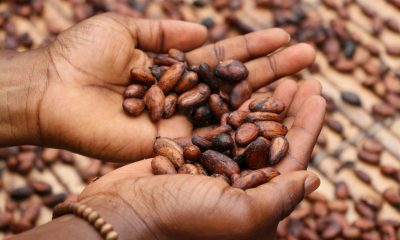Featured
Agricultural markets saw a positive week amid good demand news
Almost all agricultural markets had a positive week. Corn closed higher as demand news started to improve. Soybeans and products were also higher as the market reacted to positive demand news. World vegetable oils markets were firm, and cocoa futures closed a little higher. Cotton was higher as USDA showed better-than-expected demand potential in its monthly supply and demand updates.

Wheat
Wheat markets were higher last week as almost all agricultural markets had a positive week. The weekly export sales report continued to show improved sales and the monthly Supply and demand report showed no changes for US data. World agricultural markets remain rather soft as prices in Europe and Russia were steady to weaker. It was mostly a short-covering rally after weeks of moving lower.
Speculators did most of the buying. Australia was in the news last week as ABARES cut its production estimates for Winter Wheat by a couple of million tons. It remains very dry in some eastern areas and in the west. Some eastern areas of the country have seen enough rain and have good production prospects. But the agency noted that most Winter Crops, including Wheat, remain stressed. The trends remain down on the weekly charts despite the recovery last week so no one should be looking for more than a short term correction.
The US Dollar remains strong and the Dollar strength will inhibit any major rally attempts as the US will need cheaper prices to remain competitive. But the rally can extend for a while as the market has become very oversold. The Spring Wheat harvest should be winding down in the US and progressing rapidly in Canada. The Winter Wheat planting should be getting underway now.
Corn
Corn closed higher as demand news started to improve. Mexico bought at least 1.0 million tons of US Corn last week as seen in the daily USDA announcements. The administration worked hard to appease ethanol and biofuels interests last week. They proposed to partially restore some of the demand it killed when it gave 31 refineries blending waivers by increasing the mix to 15% from the current 10%.
President Trump said negotiations were moving along well on Friday, but it is doubtful that Corn producers and ethanol interests will be completely satisfied with this outcome. The administration is also pushing hard for Congress to ratify the new free trade agreement with Mexico and Canada. The agreement faces a tough road as both the right and the left have problems with it. Labor thinks they are not well enough protected and the right wants to support its business voters and has its own objections.
The lack of an agreement has not hurt sales to Mexico, our largest customer. But new moves in the immigration front might as Mexico objects to keeping Central Americans on its side of the border while asylum hearings are scheduled. It rightly fears that most and almost all cases will be denied by the current administration and it will have a bigger and bigger mess on its hands. At least the Corn is still moving south and other business seems to be getting done as well.
Soybeans and soybean meal
Soybeans and products were higher as the market reacted to positive demand news. China and the US each made concessions in front of the next round of trade talks scheduled for sometime next month, with the US waiving and increase in tariffs for a couple of weeks and China exempting Soybeans and Pork from its tariff list for now. China turned and bought about 600,000 tons of US Soybeans last week according to wire services but USDA only confirmed sales of 200,000 tons on Friday.
Expectations are that more sales announcements will be made this week. The USDA production reports were a little bearish as production and yields were higher than expected by private analysts. Like Corn, the results from USDA were within the range of trade expectations and were lower than some of the estimates from the biggest private estimators.
Corn and Soybeans both seem to have made at least interim lows in the last week. Corn had a reversal day up on Thursday and trends on the daily Soybeans charts turned up. It looks like prices in these agricultural markets can rally for the next few weeks until production prospects become more clear and the actual harvest comes closer.
Rice
Rice was higher last week and appears poised to test the 1250 area basis November sooner rather than later. The USDA reports were bullish and tended to confirm trade ideas. The major bullish news in the reports was the reduced planted and harvested area for long-grain Rice. The acreage cut was not completely unexpected but still gave bullish ideas to traders. The yield estimate was down from last month, but many feel that the yield will need to be cut further.
All in all, it looks like a short to very short production for long-grain Rice this year and higher prices should be expected. The demand side appeared to pull back on the recent rally but might have to adjust buying ideas higher if the crop gets smaller in coming reports. Medium and short-grain saw relatively bearish estimates as the higher production forecasts for those agricultural markets were maintained.
Palm oil and vegetable oils
World vegetable oils markets were firm last week. Palm Oil got mixed news last week. MPOB showed lower production and good demand and ending stocks for the month were lower. The private surveyors showed that exports for the start of September were off to a weaker start and that kept any rally potential in check. Soybean Oil was higher as the US government looked for ways to improve biofuels demand after granting the waivers to 31 small refineries a couple of weeks ago.
The US government has proposed to increase the amount of biofuels blended into gasoline and diesel and this could help a little bit but will go only partway to restoring the lost demand caused by the government waivers a few weeks ago. The US is facing increased competition for sales now from South America, and mostly from Argentina. Argentina has traditionally been the major source for Soybean Oil in the world market as it prefers to use other oils at home for its cooking needs.
China is opening its agricultural markets to Argentine Soy products in a move that hurts US export prospects longer term. Canola was slightly higher last week as the harvest remained active. Parts of the Prairies remain too dry although rains have increased lately. The provincial reports have noted the uneven conditions as the growing conditions have been rated less than 50% good to excellent. Canola sellers are hoping that a thaw in China-US relations could lead to improved Chinese demand for Canola.
Cotton
Cotton was higher and trends turned up on both the daily and weekly charts. The rally started as another storm took aim on the Carolinas. Buying also surfaced as USDA showed better than expected demand potential in its monthly supply and demand updates. Production was estimated in line with trade expectations.
The result was that ending stocks did not change from last month. Many analysts had looked for ending stocks projections to increase and some of the bigger name Cotton market analysts had expected a significant jump in ending stocks. The fact that USDA left ending stocks unchanged was bullish against expectations although the ending stocks projections remain large by any measure.
Demand remains a problem for the market as the weekly export sales reports have not been strong. The weaker current demand should be enough to keep prices from going very high but the charts offer hopes that futures could eventually trade to 69 cents per pound basis December futures.
Frozen concentrated orange juice and citrus
FCOJ was little changed last week. Traders were keeping a close eye on a couple of storms that could hit Florida. One was nearby but appeared on track to curve back away from the state and northeast into the Atlantic. One was still farther east and was still forming and determining its track at the end of last week. It is the high point in the hurricane season and forecasters were already watching a new system trying to form in the Atlantic.
Chart patterns are mixed in response to the hurricane threats and the potential for more systems to form in the short term. The weather in Florida had been good as the state has seen frequent showers and storms that have aided in development in the fruit. Inventories in Florida are still well above a year ago. Fruit for the next crop is developing and are as big as baseballs. Crop conditions are called good.
Coffee
New York closed higher for the week and had its most impressive rally week in a long time. The Arabica growing areas are waiting for rains to restart flowering after some rains earlier in the year. Vietnam crops are thought to be big despite some uneven growing conditions this year. It has been warm and dry at times, then the growing areas have seen some very heavy rains. Demand has been increasing over the last few years on the consumer level, but production potential is growing faster.
Producers in Brazil have the best chances to make money at current prices as they have more mechanized farming. Vietnam has more mechanization, too. The rest of the Coffee origin world will struggle due to more difficult growing terrain and higher costs of production. The weaker production this year should help to hold prices from going much lower and the price action from last week implied that futures have found a low value for now.
Sugar
New York closed lower for the week in New York, but higher in London. London got support from reports of poor yields for Sugar beets in Europe and Russia. New York was lower as ideas of big supplies and just average demand continue to circulate. World supplies still appear ample for the demand potential.
Reports from India indicate that the country still has a large surplus of White Sugar that probably must be exported. India is reporting very good monsoon rains and production prospects for this year are strong. Brazil mills are refining mostly for ethanol right now as has been the case all season. The fundamentals still suggest big supplies, and the weather in Brazil is good enough and India has improved to support some of the big production ideas.
The weather has been much more uneven in production areas from Russia into Western Europe. Those areas had a very hot and dry start to the growing season. Better weather was seen in early August then it turned hot and dry again. These areas need more rain and some cooler weather to provide better conditions for the final development of the crops.
Cocoa
Futures closed a little higher and trends are up in both agricultural markets. The reports from West Africa imply that a big harvest is possible in the region. The market could start to act weaker as the next main crop harvest comes closer to reality in West Africa. In fact, some initial harvesting is being reported in Nigeria, but most areas will not start the harvest just yet. The weather in Ivory Coast has improved due to reports of frequent showers.
The precipitation is a little less now so there are no real concerns about disease. Ideas are that the next crop will be good. Growing and harvesting conditions in Asia are also reported to be good. The harvest is ongoing amid somewhat drier weather. More and more Asian Cocoa has been staying at home and processed in Indonesia for export in the region. Demand in Asia has been growing and Indonesia has been eager to be the primary source of Cocoa.
—
DISCLAIMER: This article expresses my own ideas and opinions. Any information I have shared are from sources that I believe to be reliable and accurate. I did not receive any financial compensation for writing this post, nor do I own any shares in any company I’ve mentioned. I encourage any reader to do their own diligent research first before making any investment decisions.

-

 Biotech4 days ago
Biotech4 days agoNew Molecular Clues Explain Aggressive Neuroblastoma and Point to Targeted Treatments
-

 Fintech2 weeks ago
Fintech2 weeks agoImpacta VC Backs Quipu to Expand AI-Driven Credit Access in Latin America
-

 Fintech1 day ago
Fintech1 day agoSwissHacks 2026 to Launch Inaugural Swiss FinTech Week in Zurich
-

 Impact Investing1 week ago
Impact Investing1 week agoClimate Losses Drive New Risk Training in Agriculture Led by Cineas and Asnacodi Italia
























